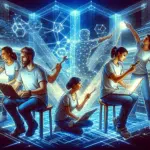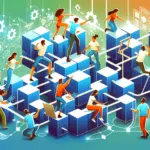In blockchain development, orchestrating distributed teams demands more than routine remote collaboration tactics. How do you ensure seamless integration of global talents when building decentralized solutions? For the success of a blockchain project, it is crucial to hire the right talent and choose the right development agency. This concise guide cuts through the clutter and details “the art of remote collaboration navigating distributed teams in blockchain development”, addressing everything from setting the right team culture to picking and utilizing tools that resonate with the unique needs of blockchain development. Additionally, it emphasizes the need to establish clear communication channels and encourage open communication, ensuring alignment and productive collaboration across remote teams.
Key Takeaways
Building a successful remote blockchain team hinges on establishing a culture rooted in principles like decentralization and transparency, encouraging open communication, valuing diversity, and engaging with the broader community.
Effective distributed team collaboration is facilitated by the strategic use of communication and project management tools, promoting both synchronous and asynchronous interactions, and adapting work arrangements to handle multiple time zones.
Security, compliance, and continuous learning are vital in remote blockchain development, requiring rigorous cybersecurity measures, staying abreast of regulations, and maintaining a balance between work, education, and well-being to drive innovation.
Crafting a Cohesive Distributed Team Culture
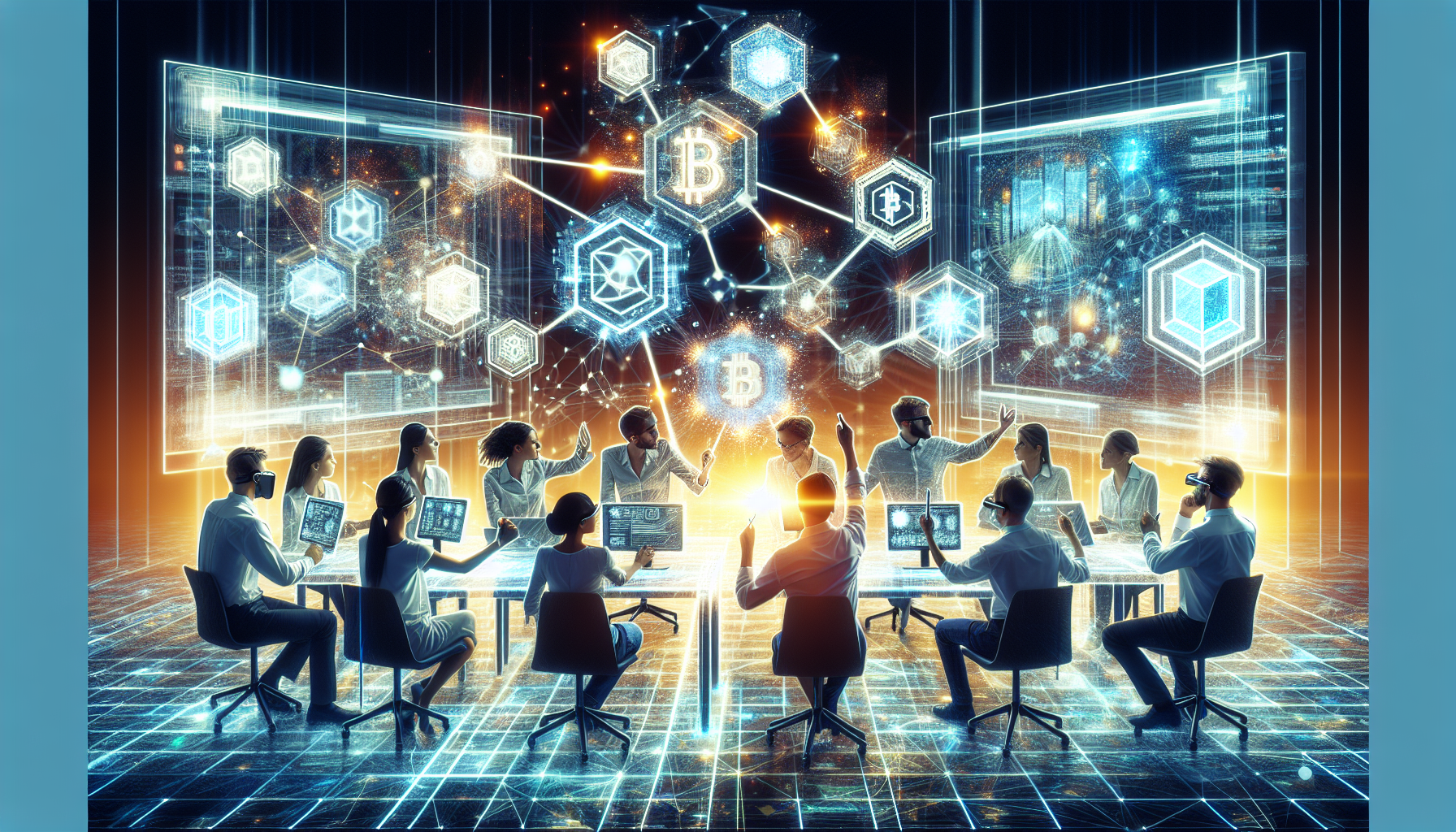
Within the realm of blockchain, your team is a bastion of strength. Establishing a unified culture within distributed teams hinges on embracing fundamental values such as decentralization, transparency, and trust. These foundational principles steer every choice and interaction, forming the cornerstone for prosperous remote teamwork.
Ensuring everyone is on the same page is crucial for effective collaboration and achieving common goals.
The lifeline of any distributed team is its recurrent meetings—infusing vigor and coherence across the spread-out constellation of individuals working remotely. Their purpose extends beyond simply updating each other. They serve to foster an environment ripe for innovation while nurturing open communication among colleagues. By advocating for diversification in skills among members, you inject vitality into all undertaken projects and strategies.
Equally important to varied competencies is diversity in thought processes. Selecting individuals with disparate backgrounds and insights when building your blockchain crew ensures that intricate challenges are addressed from multiple angles.
Never overlook community’s transformative effect—it’s crucial not just within but also outside your startup’s walls.
Cementing trust
Solidifying loyalty
Enhancing advocacy
Constructing a tough cultural fabric
It’s this shared commitment to common goals that equips teams with the ability to remain interlinked and engage cooperatively even when geographically dispersed.
Leveraging Tools for Seamless Collaboration
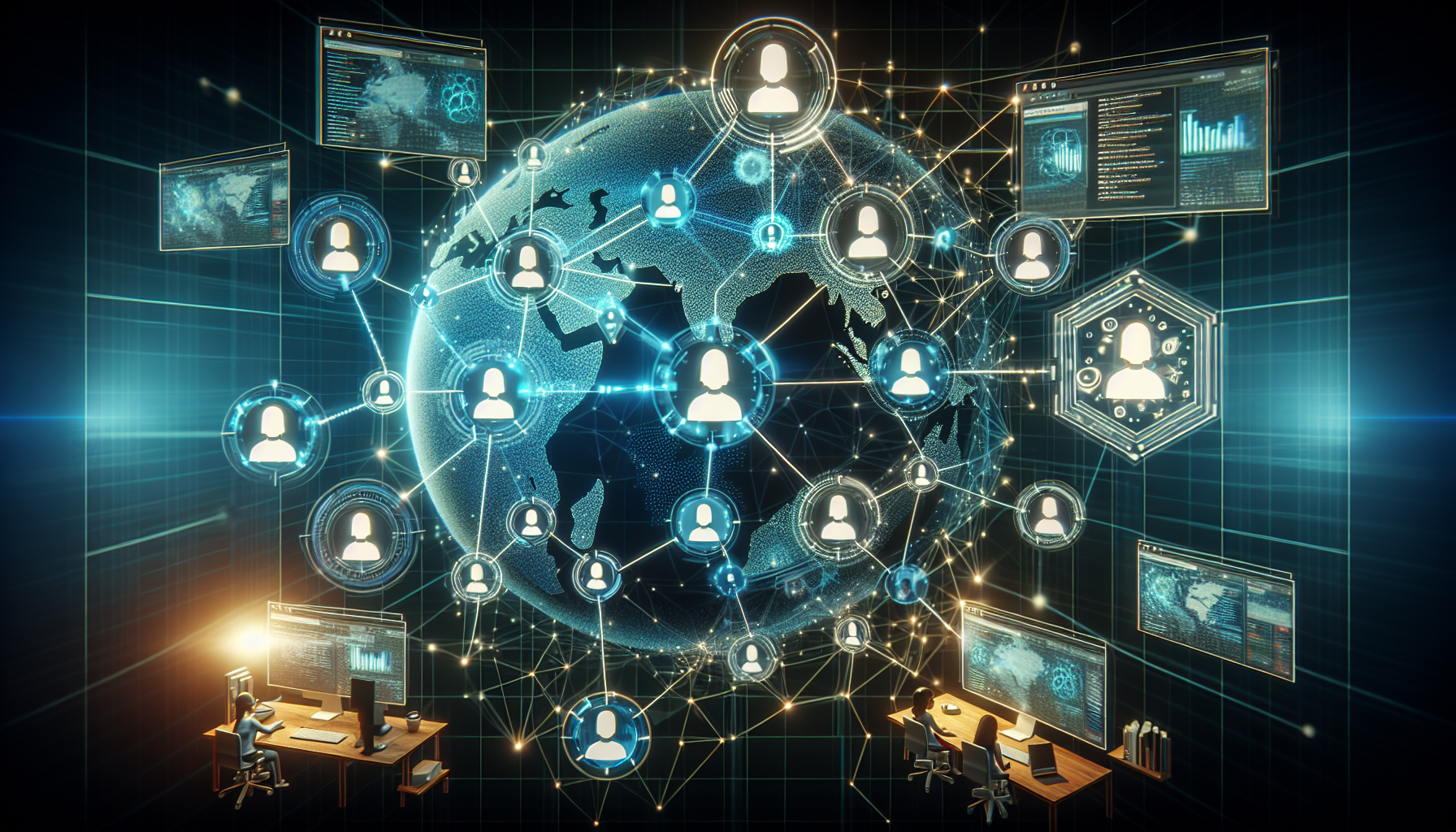
Effective collaboration is not a matter of chance. It’s carefully crafted with the strategic use of communication tools and established guidelines. Instant messaging apps like Slack facilitate seamless communication and real-time collaboration. Platforms such as Slack for instant messaging or Zoom for video conferencing are pivotal in ensuring that each team member, regardless of location, remains informed and aligned. The role of asynchronous communication cannot be overstated when it comes to maintaining connections and keeping teams up-to-date.
Project management software serves more than just task tracking – they act as navigational aids through the complexities of deadlines and work requirements. Applications like Trello and Jira enable you to allocate tasks, impose timelines, and assess your remote team’s effectiveness in collaboration by monitoring task completions and how promptly communications are answered.
Merging ChatOps with DevOps practices demonstrates the type of innovative solutions at our fingertips. Integrating ChatOps, which involves using chat interfaces for technical operations, with DevOps practices while embracing automation reduces mistakes while enhancing collaborative work significantly. As for shared codebases, GitHub unifies distributed teams’ technical competencies effectively, while platforms like Notion or Snapshot address the distinctive needs associated with web3 ventures.
Platforms specialized in virtual collaboration such as Miro, Microsoft Whiteboard, along with Microsoft Teams have become crucial arenas for distant brainstorming sessions and exchanging resources, confirming that physical distance poses no obstruction to creative thinking or innovation whatsoever. This array of collaborative tools combined with dedicated active listening skills fosters effective communication, which forms a solid base from which distributed teams can construct their towering achievements.
Synchronizing Across Time Zones
Synchronizing team meetings for a distributed team spread across various time zones is both essential and complex. It requires an awareness of global timings coupled with open dialogue regarding working hours, all in the spirit of promoting mutual respect among colleagues.
Maintaining work-life balance goes beyond simple politeness—it’s critical for ongoing effectiveness. Team members need to be mindful about each other’s personal hours and patient with varying response times due to time zone differences. Communicating deadlines clearly within every applicable timezone ensures that expectations are understood by all, leading to greater satisfaction and efficiency.
Adopting flexibility is key when coordinating a dispersed workforce. Through split shifts or modified schedules, teams can find ways to overlap their working periods, enabling better collaboration opportunities. Such adaptability nurtures spontaneous interactions which can reinforce interpersonal connections within the team as well as bolster overall output quality.
The Role of a Remote Project Manager
The role of a remote project manager leading a distributed team is central and essential, as they are charged with overseeing the entire lifecycle of web3 product development and cultivating stakeholder relationships. Their duties span from initial requirement collection to the cultivation of stakeholder relationships.
To excel in this role, it is crucial to gain insights into various aspects of project management and blockchain development.
Within their professional arsenal, the project manager should have:
The skill to define project scope and assign tasks
Proficiency in agile or hybrid methodologies tailored for the fluid environment of blockchain initiatives
Expertise in orchestrating personnel, processes, and technology aspects
A harmonious blend of technical knowledge and managerial acumen
Given that blockchain intricacies involve complex elements such as its architecture and smart contracts, it’s imperative for a project manager to have an immersive understanding of these areas to efficiently manage remote teams. This individual plays an instrumental role beyond just technical management. They’re key in promoting transparent communication channels, ensuring inclusivity within diverse cultural backgrounds among team members. Additionally, they must encourage open communication by establishing clear communication channels and fostering feedback to manage remote teams effectively.
Ensuring Security and Compliance in Remote Blockchain Development
In the ether of blockchain development, security stands as the watchtower. Cybersecurity threats loom large, and protecting digital assets is a task of paramount importance. Implementing VPNs, maintaining firewalls, and ensuring encrypted data storage are just the tip of the iceberg when it comes to device security in remote setups.
Multi-factor authentication is the gatekeeper, adding layers of verification that significantly reduce vulnerabilities. Maintaining high-security standards in remote workspaces is not optional; it’s a necessity to protect the sensitive information that flows through the blockchain ecosystem.
Navigating the ever-evolving regulatory landscape is akin to charting a course through uncharted waters. As legal frameworks for blockchain and DeFi develop, staying informed and compliant is crucial for mitigating risks while fostering innovation.
Advancing Skills and Knowledge in a Dynamic World
The digital landscape of blockchain projects is ever-changing, and securing a competitive advantage requires continuous education. Individuals in the blockchain sphere must find equilibrium between professional responsibilities, ongoing learning, and personal health to stay mentally nimble for innovative thinking.
Gaining insights into industry trends through various platforms is crucial for staying competitive. Achieving a harmonious balance supports long-term achievement within the fast-paced realm of blockchain technology. This stability empowers experts to address intricate challenges with mental clarity and acute concentration. Keeping abreast of industry trends through various platforms such as blogs, discussion forums or online seminars is critical—not merely advantageous—for success in decentralized remote roles associated with blockchain.
Within the ecosystem of blockchain communities lies:
An abundance of knowledge-sharing and connectivity prospects intrinsic to these endeavors
Insights into how their transformative impact can shape responsible advancements across sectors
Visibility into defined career trajectories offered by burgeoning startups which underline significant duties available alongside prospective growth
Engaging actively within this community not only enhances comprehension regarding sector developments, but also opens doors to invaluable connections while endowing individuals with an edge over competitors through deeper market understanding gained from direct involvement.
The Impact of AI and Emerging Technologies on Remote Collaboration
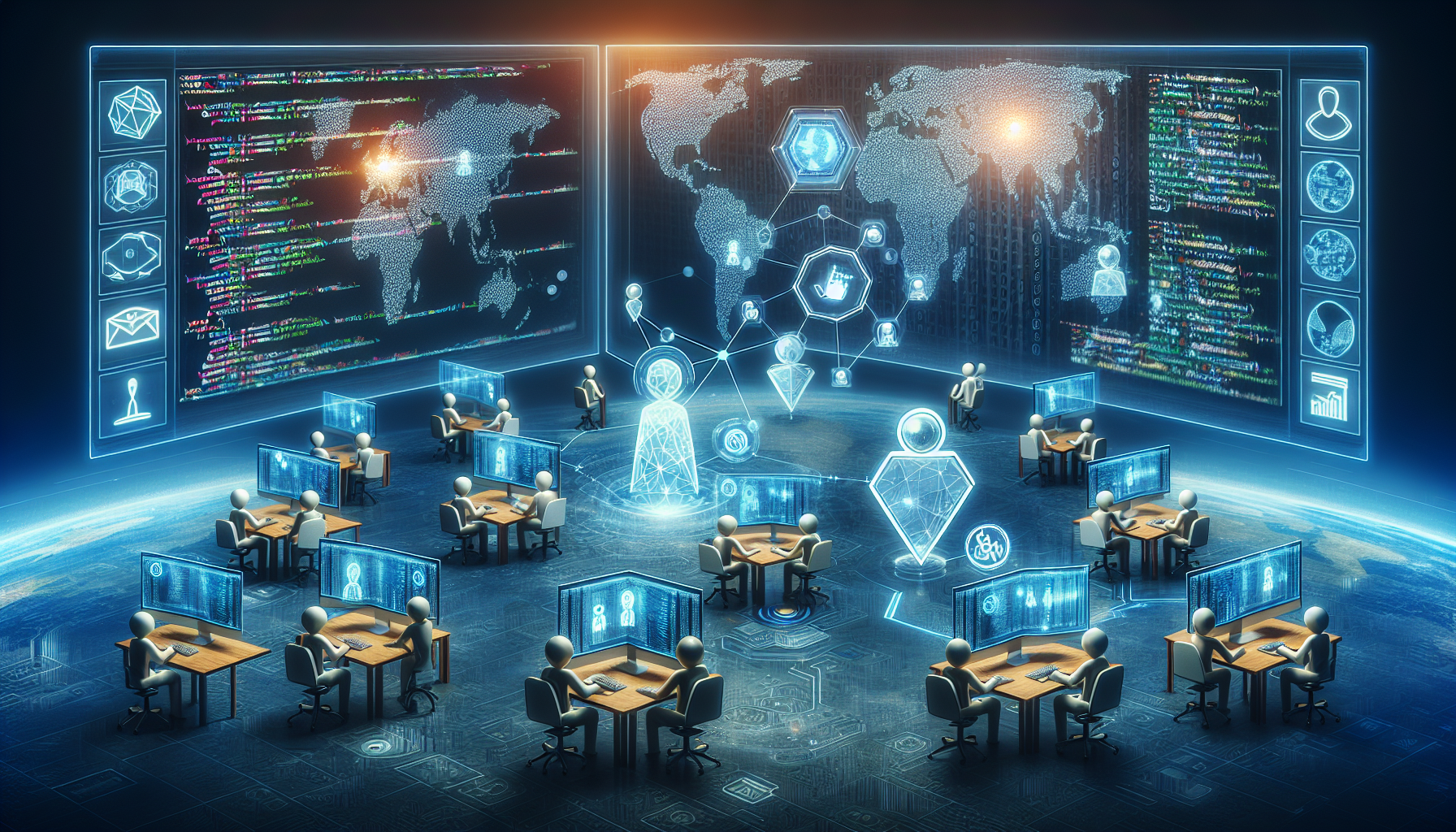
Artificial intelligence and emerging technologies are not just buzzwords; they are the catalysts propelling remote collaboration into a new era. GenAI breakthroughs are redefining how distributed teams operate, driving digital transformation and enhancing the collaborative experience.
Data privacy remains a cornerstone in the age of AI, as the journey from data collection to analysis demands a vigilant approach to digital privacy. When blockchain intertwines with AI and big data, the result is amplified functionality in DeFi applications, tackling complex problems such as predictive analysis and automated decision-making with ease. Effective data management plays a crucial role in ensuring the security and privacy of this information, and data scientists are at the forefront of these efforts.
AI technologies also promise to address the scalability conundrum that blockchain platforms face. By leveraging AI, these platforms can handle a larger volume of transactions, streamlining processes that were once bottlenecks.
Harnessing Decentralized Finance and Blockchain Applications
Blockchain technology is revolutionizing the financial industry. It introduces secure, immutable ledgers that are transforming decentralized finance by changing our approach to and interaction with financial systems. The introduction of blockchain has brought enhanced efficiency and transparency into financial transactions, significantly diminishing fraud risks.
Thanks to smart contracts on the blockchain, which execute themselves automatically according to their terms, we’re seeing a simplification in procedures that historically required third-party intermediaries. Decentralized applications (dApps) broaden access to financial services for those who have been previously marginalized from these systems – offering new opportunities for economic empowerment.
As we gaze towards what’s ahead, it is evident that blockchain and DeFi will likely foster partnerships combining traditional banking structures with forward-thinking DeFi organizations. These collaborations could dismantle existing barriers within global finance.
Summary
As we draw this exploration to a close, we reflect on the key insights gleaned from our journey through the realm of remote blockchain collaboration. From the importance of cultivating a team culture to the transformative effects of AI and DeFi, we’ve navigated a landscape rich with challenges and opportunities.
Let this be a beacon for your own voyage into the world of blockchain development. As you chart your course, remember that the winds of innovation will continue to drive this industry forward, offering new horizons and opportunities for those who dare to sail into the digital future. Additionally, always encourage open communication to ensure successful and productive collaboration within your remote blockchain teams.
Frequently Asked Questions
What are the core principles essential to fostering a strong distributed team culture in blockchain development?
Creating a robust culture within a distributed blockchain development team hinges on embracing key concepts like decentralization, transparency, and trust. This is reinforced through consistent team meetings and vigorous participation in the wider community.
It’s equally critical to thoughtfully choose team members who bring varied skills to the table, as this variety strengthens the collective ethos of the group.
How do project management tools contribute to the success of remote blockchain teams?
Employing project management applications such as Trello and Jira can assist remote blockchain groups in streamlining their workflow by scheduling tasks, imposing deadlines, monitoring advancement, and assessing the efficacy of teamwork. This contributes to sustaining both coherence among team members and overall productivity.
What strategies can help synchronize work across different time zones in remote teams?
The key strategies to synchronize work across different time zones in remote teams include accommodating meeting schedules, being patient with response times, stating deadlines in all relevant time zones, and maintaining flexible work arrangements.
This helps respect team members’ work-life balance.
Why is security such a high priority in remote blockchain development?
In the realm of remote blockchain development, securing digital assets against cyber threats is paramount. Leveraging tools such as VPNs and multi-factor authentication, along with maintaining a current understanding of cybersecurity best practices, are essential measures to ensure this protection.
By implementing these security protocols diligently, sensitive information related to the blockchain can be effectively shielded from potential vulnerabilities and risks.
What role do AI and emerging technologies play in enhancing remote collaboration for blockchain development?
Emerging technologies and AI are revolutionizing remote collaboration in blockchain development by optimizing communication, streamlining decision-making processes, and tackling issues related to scalability. This transformation greatly enhances the efficiency and effectiveness of distributed teams working together from different locations.
Posted in Blockchain, Software Development
